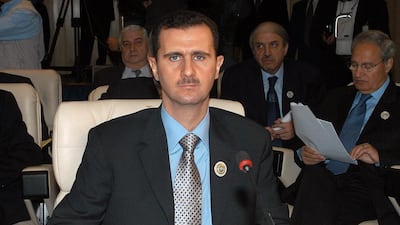As Syria breaks apart into de facto mini-states, it’s difficult to recall that its leaders always portrayed it as the prime Arab nationalist state. In other words, Syria’s ultimate destiny was to be a vanguard in forming a broader Arab nation.
Yet in a speech last weekend Bashar Al Assad said something quite different. He admitted his military was suffering from “manpower” problems and as a consequence it might have to consolidate its hold over certain areas at the expense of others.
In saying so, Mr Al Assad engaged in a double betrayal. On the one hand, he gave up on his Arab nationalist aspirations by admitting that Syria’s regime, far from working towards a greater Arab nation, was accepting fragmentation at home. And the president engaged in a second betrayal – this one less obvious and more paradoxical – of an ideology to which the Assads always implicitly adhered, but would never have admitted to.
That ideology is pan-Syrianism, whose most prominent advocate was Antoun Saadeh with his Syrian Social Nationalist Party (SSNP) founded in the 1930s. The SSNP sought to establish a Greater Syria in the Fertile Crescent, in the territories of modern-day Syria, Iraq, Lebanon, Jordan and Palestine.
There was a time when the Baathists and the SSNP were the bitterest of rivals. The desire to create a Greater Syria was regarded by pan-Arabists as contrary to their own drive to make Syria part of a larger Arab nation. In fact, in the 1950s, the SSNP was accused of being behind the assassination of Adnan Al Maliki, a senior military officer close to the Baath party.
This led to a severe crackdown on the SSNP, until Hafez Al Assad became president after a coup in 1970. The party was increasingly tolerated by the regime, and in 2005, under Bashar Al Assad, it was legalised. Yet in many respects Hafez and Bashar have behaved more as pan-Syrianists than as Arab nationalists.
While they were never able to create a Greater Syria, their policies in surrounding countries were very much focused on imposing Syria’s priorities upon them. This helped reinforce the Al Assads’ Syrian nationalist bona fides, while usefully detracting from the fact that an Alawite minority was running the country.
Syria deployed its armed forces in Lebanon for 29 years, effectively ruling the country for four decades. While there was no formal integration of Lebanon and Syria, Hafez Assad’s intent was always clear in his description of the Lebanese and Syrians as “one people in two countries”. In other words the ties that bound the two were deeper than formal unification.
The Assad regime, and indeed the Salah Jadid-led regime before it in which Hafez Al Assad served as defence minister, also sought to control the Palestine Liberation Organisation starting in the mid-1960s. After the assassination in 1966 of Yusif Urabi, a Palestinian officer in the Syrian army whom Mr Al Assad had tried to force on the Palestinian leadership, Yasser Arafat and other Palestinian officials were briefly imprisoned.
Syria’s efforts to take control of the Palestinian cause continued throughout the 1970s and 1980s. When Bashar Al Assad came to power in 2000, he pursued this strategy by backing Hamas against Fatah and the Palestinian Authority. With the outbreak of the uprising in Syria, however, his ties with Hamas deteriorated.
In Iraq, too, the Assads have always aimed to retain leverage, partly because the Iraqi Baath was a rival of the Syrian Baath.
While the two countries organised occasional terrorist operations against each other in Hafez Al Assad’s day, it was under Bashar after 2003 that Syrian interference in Iraq rose to new levels.
Following Saddam Hussein’s removal, Mr Al Assad feared that Iraq would be used by the Americans as a staging ground to topple his regime. His intelligence services built up ties with their former enemies in the Iraqi Baath to support them against the Americans, while also funnelling Sunni jihadists into Iraq.
The Syrians repeatedly tried to shape policy in Iraq later on, which meant encouraging attacks against prime minister Nouri Al Maliki’s government. Syria then acted independently of Iran, which supported Mr Maliki.
However, since 2011, Iran’s influence in Syria has risen dramatically, so that Syrian and Iraqi interests were brought into alignment. Baghdad, fearing a Sunni jihadist victory against Mr Al Assad, backed him against his foes.
The great innovation of Hafez Al Assad, both to preserve his regime and defend Syrian stakes, was always to export instability to Syria’s neighbours, making Damascus indispensable for resolving the ensuing crises. That is why Mr Al Assad saw it as essential to keep a finger in the pie of surrounding Arab countries.
This may sound far from the SSNP’s dream, but it derives from a similar motive: to turn Syria into a focal point for the region, in such a way that Damascus can impose its political agenda. Now, Bashar Al Assad can only lament what he has lost. As he has admitted, he is struggling to maintain a smaller Syria.
Michael Young is opinion editor of The Daily Star newspaper in Beirut
On Twitter: @BeirutCalling


